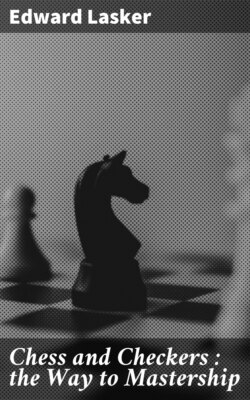Читать книгу Chess and Checkers : the Way to Mastership - Edward Lasker - Страница 3
На сайте Литреса книга снята с продажи.
PREFACE
ОглавлениеTable of Contents
The present world war has given great impetus to the game of Chess. In the prison camps, in the field hospitals, in the training camps and even in the trenches Chess has become a favorite occupation in hours of leisure, not only because it offers a most fascinating pastime, but mainly because it serves beyond any doubt to develop what is now the most interesting study for every soldier—the grasp of the principles underlying military strategy and the ability to conceive and to carry out military operations on a large scale.
Frederick the Great, Napoleon and Moltke, the great scientists of war, had a decided liking for the game of Chess and owed to it many an inspiration which helped them in laying out their military plans. Indeed, no other game exists which offers such complete analogies to war.
Two armies oppose each other on the Chess board, composed of different units which may well be compared with infantry, cavalry and artillery.
The success of the operations on the board, which represents the battlefield, does not depend upon any element of chance, but solely upon the ingenuity and the skill of the players who are the commanders-in-chief of the forces.
Although a Chess game differs from a battle in that the material strength of the opponents is equal, the order of events is the same in Chess as in war. The troops are first mobilized and made ready for action with utmost speed, then important positions are occupied which give the troops freedom of action and insure safe lines of retreat and, finally, when the formation of the enemy is known, the strategic plan is made which the generals try to carry out by means of different tactical maneuvers.
Considering this similarity of Chess and war it is not surprising that Chess has gained greatly in popularity among all those whose work or thought is more than superficially influenced by the present war.
No special inducement, however, would be necessary to learn the game, were it more generally known that great advantage is to be derived from the study of Chess, quite apart from the cultivation of strategic ability.
The faculty which is developed by playing Chess is useful wherever logical thinking and concentration are needed, and it cannot be denied that these qualities are most desirable in the every day struggle in which mental work has so largely superseded manual labor.
The thoughtful playing of the game not only cultivates the logical quality and imaginative power of the mind but also tends to develop strength of character. It teaches us not to be hasty in our decisions, but to exercise foresight at all times as we must abide by all consequences of our actions. Moreover, we learn from it circumspection which causes us to survey the whole scene of action and does not allow us to lose ourselves in detail; we also learn not to be discouraged by reverses in our affairs but to hold out and always search for fresh resources.
Thus, Chess serves a good purpose for young and old. The boy will find it a fascinating pastime and, unconsciously sharpening his wits in playing the game, will acquire a fine preparation for his calling in life, no matter what it may be. For the man, and the woman too, Chess is well worth learning, as it will prove the best companion in hours of leisure.
The reason why many people hesitate to learn the game and to teach it to their children is that Chess has been misrepresented as a game which is very difficult to master. This false impression has been created mainly by the wrong methods of teaching usually employed. The majority of writers on Chess deal with a maze of variations and they expect the reader to memorize the moves with which to parry the maneuvers of the opponent, instead of simply developing a few common sense principles which are easy to grasp and perfectly sufficient to make a good player of any one.
This is really the great advantage of the game of Chess over any other board game, that it lends itself to the application of general principles, so that any one can grasp and enjoy it without memorizing more than the rules according to which the men move.
I have tried to develop these principles in a simple way so that they are sure to be easily understood, and I have been greatly aided in my task by Miss Helen Dvorak and Mr. Eugene Fuller, who, without any previous knowledge of the game, have learned it in reading through the manuscript of this book. They have given me many valuable hints in pointing out all that did not seem readily intelligible to the mind of the beginner.
In explaining the game of Checkers, to which the second part of the book is devoted, I have also tried to develop general principles of strategy, rather than to offer a mere classification of analyzed lines of play, which the reader would have to memorize in order to be able to compete with experts.
I was fortunate enough to secure the collaboration of the Checker Champion, Alfred Jordan, who enthusiastically adopted the new idea of teaching and furnished most of the material which I have used in illustrating the vital points of the game.
